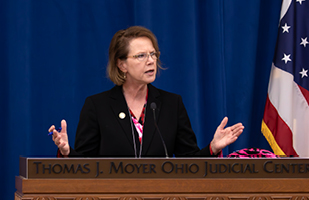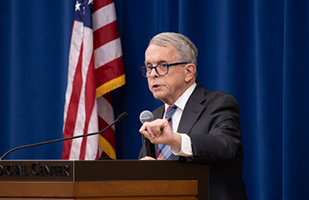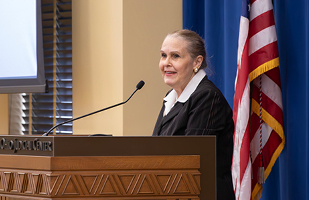Leaving Prison with the Support One Needs






(From top: Ohio Supreme Court Chief Justice Sharon L. Kennedy, Ohio Governor Mike DeWine, and retired Ohio Supreme Court justice Evelyn Lundberg Stratton) Judicial and Executive leaders come together to address mental health and reentry needs for Ohio prisoners.
The Supreme Court Reentry Taskforce is pressing ahead with recommendations regarding the challenges people face once they are released from prison. Chief Justice Sharon L. Kennedy on Tuesday told the Stepping Up Ohio Steering Committee that the Reentry Taskforce will issue recommendations by June this year; just more than a year after the Task Force was established.
The Task Force is chaired by Judge Chryssa Harnett, who oversees the Certified Reentry Specialized Docket at the Stark County Common Pleas Court. It is one of only ten reentry dockets in Ohio.
The Task Force is looking at a broad range of topics, including access to healthcare and housing for individuals who are reentering the general population. Without these necessities a person is more likely to return to prison. For example, formerly incarcerated individuals are ten times more likely to be unhoused that the general public, but when provided housing the recidivism rate drops to just four percent.
Chief Justice Kennedy told the Steering Committee that helping people to return to the community is a central tenant of the justice community.
“It is part of what I believe is the ongoing commitment when we serve in the justice system, so those who earn a life restored have an opportunity to live a life restored,” said the Chief Justice. “That they are able to come back to their community and that life is attainable and real for all of them.”
Governor Mike DeWine told the Stepping Up Ohio Steering Committee that he is frustrated by the high number of people who are sent by the courts to the six state psychiatric hospitals. Ninety-three percent of the state psychiatric beds are filled by someone under a court order. “The average person who has a mental health problem…and they’ve not committed a crime, they can’t get in there,” said Governor DeWine.
The governor told the steering committee that he will soon appoint a panel of judges, sheriffs, and mental health experts to study ways to make mental health services more accessible to not only state prisons and county jails, but also to the general public in need of help.
Stepping Up Ohio is led by retired Supreme Court of Ohio Justice Evelyn Lundberg Stratton, and is Ohio’s response to a national effort to slow the revolving door of justice by ensuring that jails and prisons have the resources to address the psychiatric and substance abuse needs of those incarcerated.


